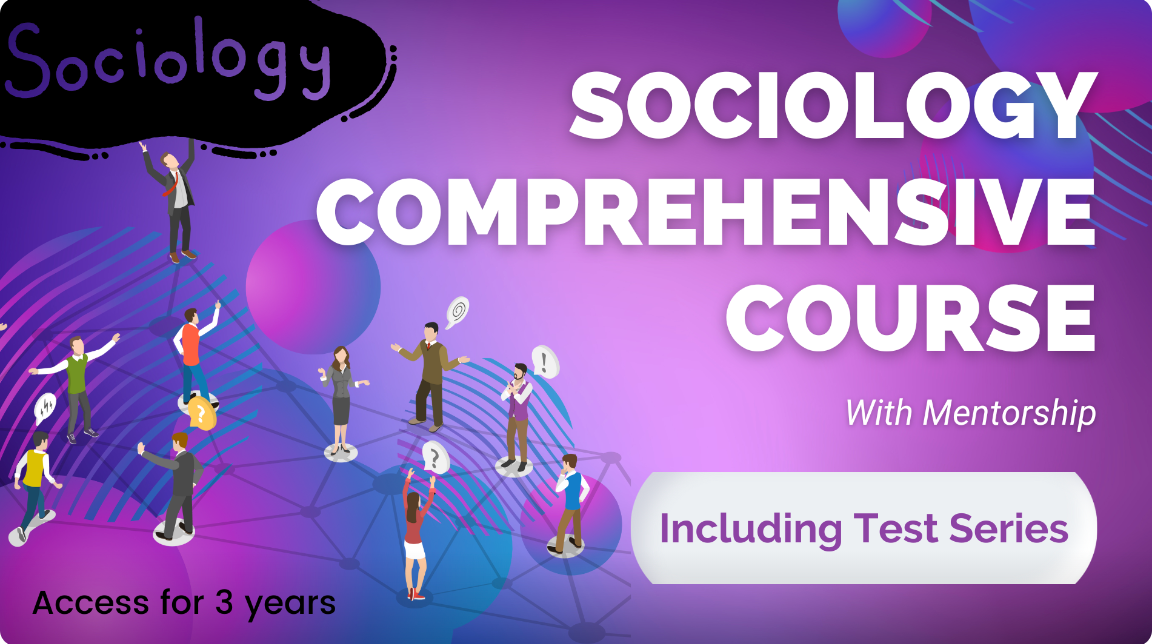Questions
- According to Durkheim, the essence of religion in modern society is the same as religion in primitive society." Comment. (10 Marks)
- Write a short note on ideal types. Write an ideal type of family. (10 Marks)
Download Model Structures PDF
Model Structures
Q1. "According to Durkheim, the essence of religion in modern society is the same as religion in primitive society." Comment. (10 Marks)
Introduction
- Durkheim in his study defined religion as “a unified system of beliefs and practices relative to sacred things, that is to say, things set apart and forbidden beliefs and practices which unite in one single moral community called a Church, all those who adhere to them".
Main Body
- In his study of religion in primitive society of totemic ritualistic practice in Australian tribes, he observed religion as mutual co-presence, common emotional mood, common understanding and identification of sacred promotes social solidarity among the faithful.
- To him, religion is the collective conscience of people that brings social solidarity in society.
- In modern times religion is not about going to church or religious institutions on the contrary the essential collective conscience of people is brought by technology in modern times.
- For him religion is ordinarily meaning a supreme form of consciousness which is eternal and binding in character.
He argues that technology is religion in modern times where people are connected through various communication technologies like mobile phones, laptop, internet people from all sections of the world are connected and share common views through their network or groups. So, social solidarity is obtained in modern times via technology. Hence religion exists in modern times in different forms.
Conclusion
- Durkheim's understanding of religion can be summarised as that his study of religion, asserts that religion is a social necessity, it provides man identity, source of integration and harmony between individual societies without which social life stands to be impossible.
Q2. Write a short note on ideal types. Write an ideal type of family. (10 Marks)
Introduction
- Ideal types are concepts formulated on the basis of facts collected carefully and analytically for empirical research. These are constructs or concepts which are used as methodological devices or tools in our understanding and analysis of any social problem.
Main Body
- Weber states that ideal types are abstractions or pure pure types not most desirable or perfect ones.
- They are to be derived from the real world and not the mirror image of that world.
- Characteristics of Ideal Types;
- Ideal types are not general or average types.
- Ideal types are neither a description of any definite concept of reality, nor a hypothesis, but they can aid both in description and explanation.
- In this sense we can say that ideal types are also related to the analytic conception of causality, though not, in deterministic terms.
- They also help in reaching general propositions and in comparative analysis.
- Ideal types serve to guide empirical research, and are used in systematisation of data on historical and social reality.
- Ideal types are not a presentation of total reality or they do not explain everything. They exhibit partial conception of the whole.
- Criticism of Ideal Types
- No specific method suggested by Weber to identify ideal types.
- It is highly susceptible to subjectivity of investigators.
- Ideal Types of Family
- It contains certain members performing socially sanctioned sexually regulated functions.
- Presence of consanguineal as well as affinal relations.
- Procreation and socialisation.
- Emotional function for personality stabilisation.
- Division of labour among members.
Conclusion
- The ‘ideal type’ is one of Weber’s best known contributions to contemporary sociology. It occupies a very important place in his methodology. Weber believed it was the responsibility of sociologists to develop conceptual tools.

